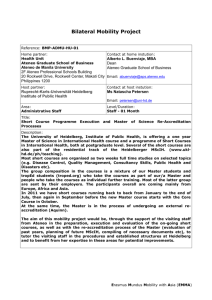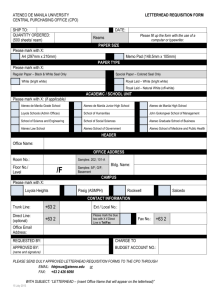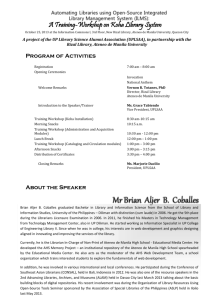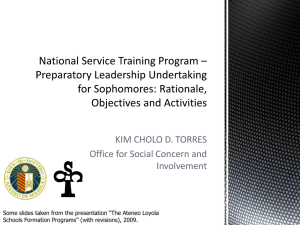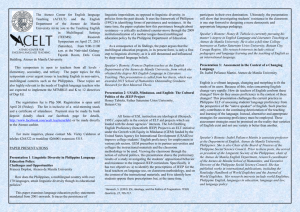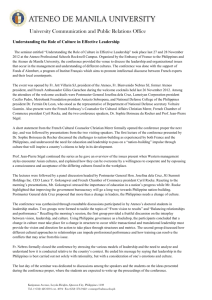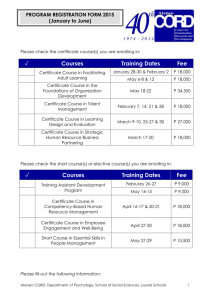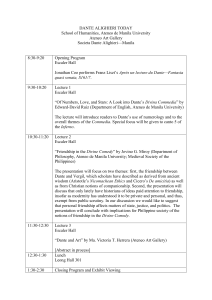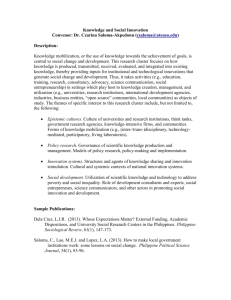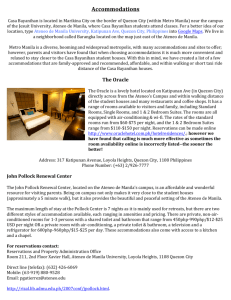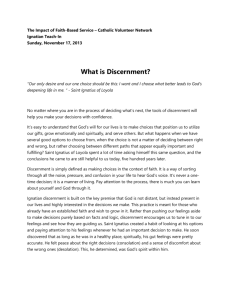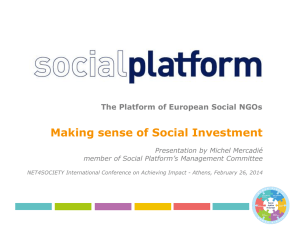InAF Write-up-FINAL
advertisement
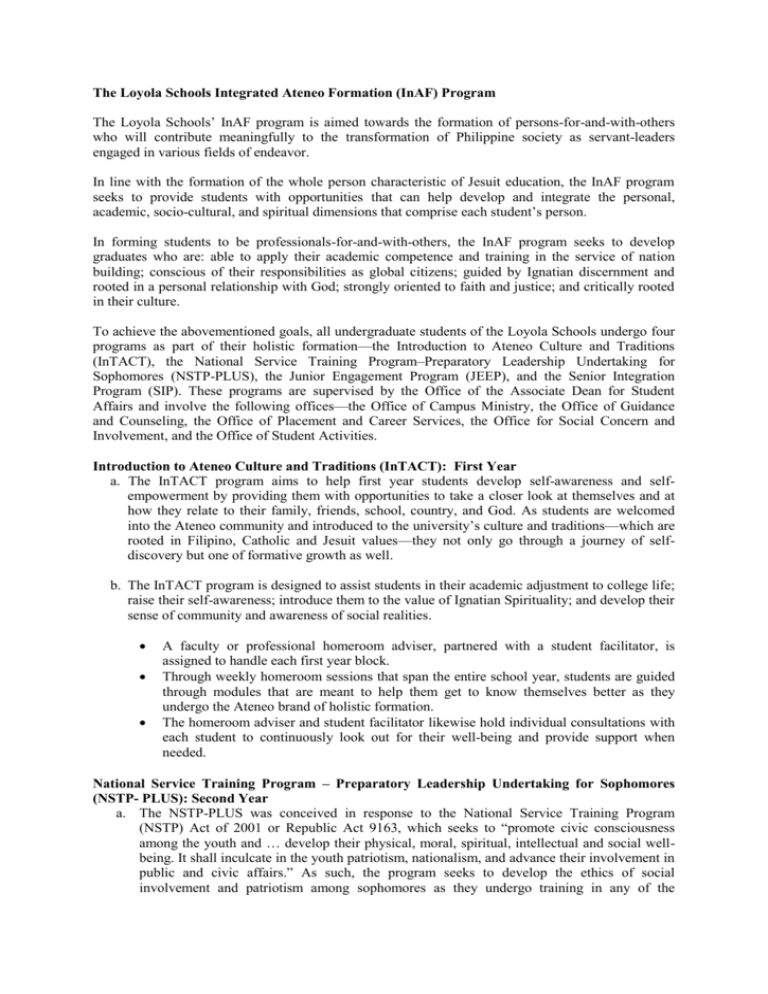
The Loyola Schools Integrated Ateneo Formation (InAF) Program The Loyola Schools’ InAF program is aimed towards the formation of persons-for-and-with-others who will contribute meaningfully to the transformation of Philippine society as servant-leaders engaged in various fields of endeavor. In line with the formation of the whole person characteristic of Jesuit education, the InAF program seeks to provide students with opportunities that can help develop and integrate the personal, academic, socio-cultural, and spiritual dimensions that comprise each student’s person. In forming students to be professionals-for-and-with-others, the InAF program seeks to develop graduates who are: able to apply their academic competence and training in the service of nation building; conscious of their responsibilities as global citizens; guided by Ignatian discernment and rooted in a personal relationship with God; strongly oriented to faith and justice; and critically rooted in their culture. To achieve the abovementioned goals, all undergraduate students of the Loyola Schools undergo four programs as part of their holistic formation—the Introduction to Ateneo Culture and Traditions (InTACT), the National Service Training Program–Preparatory Leadership Undertaking for Sophomores (NSTP-PLUS), the Junior Engagement Program (JEEP), and the Senior Integration Program (SIP). These programs are supervised by the Office of the Associate Dean for Student Affairs and involve the following offices—the Office of Campus Ministry, the Office of Guidance and Counseling, the Office of Placement and Career Services, the Office for Social Concern and Involvement, and the Office of Student Activities. Introduction to Ateneo Culture and Traditions (InTACT): First Year a. The InTACT program aims to help first year students develop self-awareness and selfempowerment by providing them with opportunities to take a closer look at themselves and at how they relate to their family, friends, school, country, and God. As students are welcomed into the Ateneo community and introduced to the university’s culture and traditions—which are rooted in Filipino, Catholic and Jesuit values—they not only go through a journey of selfdiscovery but one of formative growth as well. b. The InTACT program is designed to assist students in their academic adjustment to college life; raise their self-awareness; introduce them to the value of Ignatian Spirituality; and develop their sense of community and awareness of social realities. A faculty or professional homeroom adviser, partnered with a student facilitator, is assigned to handle each first year block. Through weekly homeroom sessions that span the entire school year, students are guided through modules that are meant to help them get to know themselves better as they undergo the Ateneo brand of holistic formation. The homeroom adviser and student facilitator likewise hold individual consultations with each student to continuously look out for their well-being and provide support when needed. National Service Training Program – Preparatory Leadership Undertaking for Sophomores (NSTP- PLUS): Second Year a. The NSTP-PLUS was conceived in response to the National Service Training Program (NSTP) Act of 2001 or Republic Act 9163, which seeks to “promote civic consciousness among the youth and … develop their physical, moral, spiritual, intellectual and social wellbeing. It shall inculcate in the youth patriotism, nationalism, and advance their involvement in public and civic affairs.” As such, the program seeks to develop the ethics of social involvement and patriotism among sophomores as they undergo training in any of the following components—Civic Welfare Training Service (CWTS), Literacy Training Service (LTS), or Reserved Officers Training Corps (ROTC). b. The NSTP-PLUS aims to provide students with opportunities to get to know their neighbor from the marginalized sectors of society and to respond to the call of being a gift to others through their particular academic disciplines or fields of interest. These opportunities also hope to deepen the students’ knowledge of themselves through the continuous exploration of their gifts. Through the guidance of formators and faculty from their home departments, students render three hours of discipline-based or interest-related service each week to a particular community or partner institution for the entire school year. These weekly engagements are analysed further via processing sessions and reflected upon more deeply through sessions for prayer and Ignatian discernment. Junior Engagement Program (JEEP): Third Year a. To enable third year students to further engage the world beyond the self, the JEEP aims to help juniors develop a deeper awareness of their responsibility towards the “other” and of their role as members of society. b. The JEEP is designed to provide opportunities that will allow students to critically engage in the life experiences of people who experience, or work to address the reality of marginalization. Through these experiences, it is hoped that students will gain an understanding of the various contexts of the “other” in relation to economic, political, and socio-cultural realities as well as grow in social responsibility. Through the guidance of formators in consultation with faculty from the Philosophy department, students participate in the work and daily activities of people on the margins through a 12-16 hour experience with persons-with-disability, the elderly, environmental issues, labor issues, the government sector and institutions involved in volunteer work. Such an engagement is further analyzed and reflected upon from a variety of perspectives—philosophical, personal, social, and spiritual—thus providing students an opportunity to draw together the different dimensions of their lives. Senior Integration Program (SIP): Fourth Year a. The SIP aims to help graduating students reflect on and integrate their Ateneo college experience in light of their personal vocation and the call to help build the nation. By helping seniors discern how their respective disciplines and future career decisions can respond effectively to societal needs, the program seeks to form graduates who will be catalysts for change as professionals-for-and-with-others. b. The SIP is designed to form leaders who possess a strong sense of their personal giftedness, competence in their respective fields of study, a genuine desire and commitment to be of service to the nation, and a capacity to ground their decisions in Ignatian discernment. Several activities comprise the SIP: Through an opening ritual known as the “Paglunsad,” seniors are provided an opportunity to look back at their years in the Ateneo, to prepare to deepen their commitment and involvement during their senior year, and to reflect on their future with the help of Ignatian Discernment talks. Through the PRAXIS program—a two-and-a-half-day immersion experience with marginalized communities coursed through their Theology classes—students analyze Philippine social reality in light of the Church's social teachings and the social dimension of Christian witness, and reflect on the demands such a reality makes on their lives. Through guidance testing, placement talks and a job fair, future graduates are provided an opportunity to meaningfully explore career options. Finally, through the culminating ritual known as the “Pabaon,” the graduating students are led through a prayerful reflection about the meaning of their Ateneo education and formation and receive an inspiring send-off as they venture forth from the Ateneo to be professionals-for-and-with-others.
